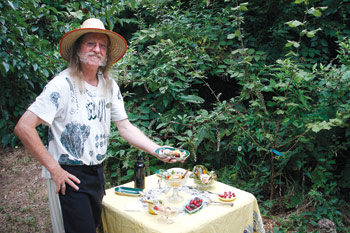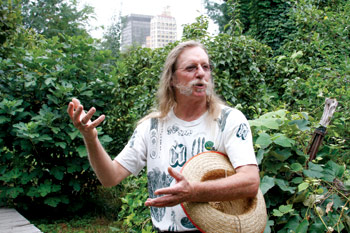Beneath a hazelnut tree, Michael Gentry, aka the Sustainable Gourmet, has placed a table. Over the brightly colored tablecloth, he's laid out a spread of food, displayed in glass dishes and assorted pieces of pottery. Right there, in Asheville's edible garden, with the terra-cotta tiles of the city building peeking through the branches of an Asian pear tree, we'll sit down to a lunch of locally grown and wild foods.

But first, we'll poke around the urban garden, while the relative coolness of the August morning lingers.
Gentry is an appreciator of wild foods and a teacher who presents his take on healthy, vegetarian cuisine with a series of cooking classes, "Everyone Cooks," held at Warren Wilson College.
"It's always seasonal, always local, always organic," he says of the curriculum. "I try to dial in the dietary needs of the people who are attending," says Gentry. "We cook a complete meal together. We sit down and enjoy it, we say a short Ayurvedic prayer that helps to center your mind and body on the food. Then we enjoy the food, clean up and then go home with the recipes."
A ripe apple falls from a nearby tree, punctuating Gentry's sentence with a loud thunk on the wooden walkway. "Ripe fruit!" he exclaims, laughing. We take that as a sign to keep walking, and Gentry busies himself pointing out the wealth of foods growing in the park.
"One of the things I love about this garden is that you're able to harvest 17 wild foods from here throughout the year," he says. He notes a fig tree, bursting with not-ripe fruit and a similarly laden pawpaw tree. "Right there is your pawpaw fruit," he says, pulling back a branch to reveal an irregularly shaped green lump. That fruit, actually a large berry, will ripen into a sweet, protein-rich snack that tastes like a cross between a banana and a mango.

Beyond the pawpaw tree, Gentry points out a plum that's already fruited and done for the season, a nectarine and a rather scrawny, ailing peach tree. There's a weeping mulberry as well, rising from a wild and trailing mess of grape vines that Gentry's spent the morning trying to tame. He notes that he frequently pulls the leaves and stuffs them to make dolmas.
Gentry says that wild foods, just like those grape leaves, are full of phytonutrients, minerals and vitamins. "These are things that we don't necessarily find in our standard American diet," he says. "There's lots of medicinal qualities to wild foods as well." As an example, Gentry cites nettles, which he says are on the top of his list of favorite things to cook with. He makes nettle pesto in the summer, and dries the leaves to make nettle rice in the winter. "Nettles provide lots of protein and silica — which helps to build beautiful hair, bones and teeth. Everyone needs that," he says, playfully fluffing his own long mane.
Gentry is an admirer of Frank Cook, a local ethnobotanist who passed away last year. Cook recommended that people attempt to eat at least one type of wild food every day. Gentry follows Cook's advice: "I always include some wild food in any offering that I do, whether it's the free food that I offer at the French Broad Food Co-op farmer's market every Wednesday for the last ten years, or a cooking class."
Once back at the table, Gentry shows us the wild white peaches he's picked from Swannanoa, and spiced cranberries and apricots gathered from the same area. There's also a salad of local potatoes with wild mint and a dish of yogurt studded with tiny, oblong cherries, picked from the branches that grazed our heads as we approached the table.
The chef points at a glass goblet that holds a golden-colored puree, garnished with wild herbs, gently wilting in the increasing heat of the late morning sun.
"This is the golden beet caviar," he says. "I wanted to provide a recipe that was really simple and really easy to replicate, which is what I try to do with my cooking classes as well. I pick recipes that are easy for folks to do again at home, so that they don't just have a wonderful time at the class, they can recreate it once they get home."
He presents us with a "squash-amole," which he makes with roasted zucchini, garlic and onions, pureed with mint, parsley, olive oil, lemon juice and salt and pepper. It's a perfect recipe for those woody summer squashes that tend to hide under leaves in the garden. And, says Gentry, it's quite easy to make. He uses that exact recipe for his cooking class, among many others.
"I try to offer a variety of recipes that reflect different skill levels and make people comfortable," he says. "I like for people to pick what they want to prepare. Some are looking for a challenge, some are looking to relax — and some just want to eat dinner."
No matter the students’ preference, Gentry hopes that they take away with them one crucial concept: "Love is the most important ingredient," says Gentry. "What we, as cooks, put into the food really transforms it from the raw material into the exquisite gourmet product that you have at the end of the cooking process. I like for people to understand that they add something very important to the total dish."
Send your food news to Mackensy Lunsford at food@mountainx.com.



Before you comment
The comments section is here to provide a platform for civil dialogue on the issues we face together as a local community. Xpress is committed to offering this platform for all voices, but when the tone of the discussion gets nasty or strays off topic, we believe many people choose not to participate. Xpress editors are determined to moderate comments to ensure a constructive interchange is maintained. All comments judged not to be in keeping with the spirit of civil discourse will be removed and repeat violators will be banned. See here for our terms of service. Thank you for being part of this effort to promote respectful discussion.